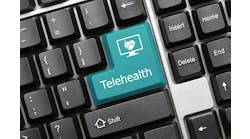Clinician leaders in hospitals have known for a long time that there is an expected gap in care from NICU to community and home. Now, leaders at Nicklaus Children’s Hospital have addressed that program through their “Baby Steps” program. The Baby Steps program, a nurse-led telehealth transition of care intervention for infants cared for in the neonatal intensive care unit (NICU) and their caregivers, was developed to address a gap in care after discharge at Miami-based Nicklaus Children’s Hospital. Baby Steps is focused on providing integral support during the discharge process and after the infant returned to home and community. Led by an interprofessional team composed of researchers, NICU professionals, and telehealth specialists, the program was guided by the Theory of Transition Model to support the situational, developmental, and health transitions that occur during this time period. Central to the intervention was nurse-led telehealth follow-up within 24-48 hours after discharge, coupled with on-demand services available for two weeks. During these encounters, a trained NICU nurse offered clinical support, addressed concerns, and provided anticipatory guidance.
Within the first 24 months of the program, a total of 450 infants were enrolled, and 492 total encounters were completed. Significant decreases in readmissions were noted (57 percent). Within 30 days of discharge 14 percent of patients enrolled in the program sought care at an emergency care setting (n=63), compared to 23 percent of NICU patients not enrolled in the program during the same time frame. Additionally, caregivers reported a high level of satisfaction, with 99.2 percent reporting they were satisfied or highly satisfied with the telehealth service (n=141). In conclusion, Nicklaus Children’s Hospital found that nurses effectively counselled caregivers, and that the use of telehealth intervention after discharge was feasible.
Healthcare Innovation had the opportunity to speak with the core team at Nicklaus Children’s Hospital regarding the Baby Steps program to get their perspectives and insights on what makes the program so unique.
Yui Matsuda, Ph.D., PHNA-BC, assistant professor, University of Miami, School of Nursing & Health Studies, began by telling the origin story behind the program. Matsuda says, “My specialty is public health nursing, so caring for people in the community is a big thing for me. I teach students and my research area is to improve family health, especially thinking about and caring for parents when a child is sick or has disabilities or developmental delays. We focus on babies and kids, but parents need to be well to be able to care for their children.”
She goes on to say, “My baby was in the NICU, so I wanted the help of a nurse because my clinical specialty is in public health nursing,” she adds. “Even though my son was only in the NICU for a few days, I needed help, and I called my friend Dr. Sarik, and I wanted something like this for others from my personal experience.”
Matsuda explains that the program attempted to launch before the pandemic but wasn’t successful due to the hesitancy toward telehealth at the time. But the team saw the advancements and acceptance of telehealth and put together a grant to make Baby Steps a reality.
Evelyn Terrell, O.T.D., director of telehealth and special projects at Nicklaus Children’s Hospital adds that, “As Dr. Masuda shared, we had attempted to bring this program to life even before the pandemic and we had some challenges, but this great and amazing grant [Florida Blue Foundation Quality of Patient Care Grant totaling $300,000] was able to help us provide the services. But we selected this population because they are the smallest. We made a decision to focus on this population that had so many discharge planning needs and transitions of care needs out of all of the populations that we serve. And we felt this was the best opportunity—focusing on these patients and these families.”
Regarding how the program is structured, Danielle Altares Sarik, Ph.D., APRN, director of nursing research and evidence-based practice at Nicklaus Children’s Hospital explains that Melody Hernandez, Ph.D., M.D., B.S.N., NICU nurse telehealth scientist, who is the lead on the program, approaches the family at beside and tells them about the program and asks if they’re interested in enrolling. If they say yes, Hernandez leads them through the process of setting up the telehealth platform and schedules them for a follow up within two to three days after discharge. “This gives them enough time to get home, settled, and take stock of what they need and don’t have,” Altares Sarik notes.
In that two to three day period, the family usually has their first follow up doctor’s appointment and Hernandez will connect with them with some general anticipatory guidance and technology checks. If there’s anything the parent wants Hernandez to look at on the baby, she does that through the telehealth technology. Some families are comfortable at this point and that may be their last visit with Hernandez but there are families that continue to want additional support or have questions. For two weeks after the discharge, families can set up an appointment with the service or they can access telehealth services on demand.
For example, Altares Sarik says, “Our population is about 70 percent Spanish speaking and about 70 percent of our patients access care through public health insurance. Language concordance is often a challenge and once they're in the community, caregivers may or may not be able to access services. The one-on-one support that the Baby Steps program provides through connections [in the community] can make the difference between the family being able to see a specialist or improve that transition for the family.”
As for the mechanics of the program, Terrell notes that the Baby Steps platform is proprietary. She notes, “Nicklaus Children's decided even before the pandemic that we were going to build versus buy and continue to improve and invest in it. One of the challenges, for example in our old platform, the patient had to create a username and had to create an account and add more data input to be able to access a platform. Now in this new workflow the patient will be receiving a link.”
Terrell adds that families receive reminders in the form of SMS text messages and the platform can be accessed through desktop, phones, and tablets. One of the key features, she adds, is language. “One of our new workflows that we are implementing involves virtual interpreters. We've always had interpreter services, it's a requirement by law, but now we're improving the process so that a language interpreter can join the virtual room and be live along with the providers and the clinicians,” Terrell states.
Tackling technology challenges
Regarding the challenges to implementing the Baby Steps program Altares Sarik says that, “One of the challenges that we anticipated when we were writing the grant, and we planned for, was that a parent or a caregiver would need to have a smart device or a tablet in order to access the services. We knew that had disparities in access in our service area. We actually wrote money into the grant for a number of tablets so that we could give those to the families if they didn’t have access.”
“Surprisingly,” Altares Sarik notes, “We have never in the history of our program had anyone actually request a tablet. Generally, families have access to a smartphone of their own or another family member’s smartphone. It underscored how ubiquitous this technology is now.”
Altares Sarik explains that one of the key things the team decided to do at the beginning of their project, as they were onboarding and credentialing their team to be able to use telehealth services, was putting together a concise workflow. Nicklaus had their telehealth partners conduct training in person for the NICU nurses, even if that particular nurse was not part of the core program. The team wanted to ensure their staff was trained in case there were technical issues or scheduling issues. “This gave our clinical nursing staff understanding and expertise in telehealth, a new skill set that they didn’t have before,” she says. “One of the reasons we looked at this grant and pursed this grant was to create the capacity for telehealth among nursing, it was an additional benefit of the program.”
Flor Tena, R.N., C.C.R.N.-K [Acute/Critical Care Knowledge Professional] manager of professional nursing practice and navigation program, Nicklaus Children’s Hospital comments, “For a long time, we’ve sought to enhance the transition of care from the NICU to the community and to the home.”
Tena adds that in her previous experience launching a telehealth program there wasn’t a designated person taking telehealth calls, it was only if individuals had time in their schedule. She adds that another barrier was that the program wasn’t free, and although she tried purchasing gift cards to help families enroll, it was a very complex and cumbersome process.
A unique telehealth program
As for the uniqueness of this program, Hernandez comments that “This is a nurse-led telehealth program, which makes it unique. Clinical nurses are well-trained to give education and anticipatory guidance to patients and also to guide them to their transition through to the community. A lot of what I end up doing is building a therapeutic relationship with the families, on the app, and on the outside. And once they're outside, I try to make sure that they know I'm their ‘anything and everything type of question’ girl. I want them to know that they can ask me anything they would have asked in the NICU and anything they would ask in the pediatrician’s office. And if I don't have the answer, I will make sure to get the answer to them. And if I have to make sure to transition them to a higher-level care, then I will make sure that they do that in the adequate form, keeping them out of the ER.”
Hernandez reiterates, “I think it's important that we have the future nurses of America understand and learn that there are more opportunities for them other than traditional beside nursing. There are so many different facets of nursing, and this is one of them.”
The team says that through the end of 2022, there were 643 infants and families enrolled in the Baby Steps program and have completed 655 visits. As for what’s next for the program, Matsuda says that “This was the first partnership between Nicklaus and the University of Miami on this type of program. Being able to show that we were able to successfully launch and continue the program is great. We have great preliminary data. But we want to rigorously evaluate the program using more research methods be able to say, ‘OK, this program does make a difference.’ Ultimately, we would like to expand and have a bigger grant.”
Altares Sarik concludes by saying that “We have been approached by multiple other hospitals and health systems who have started to learn about the program through our external dissemination and they are very interested in learning about the program, our workflow, and how to implement it. As an organization we are now focusing on how to share what we've learned, and opportunities to formalize this program.”


